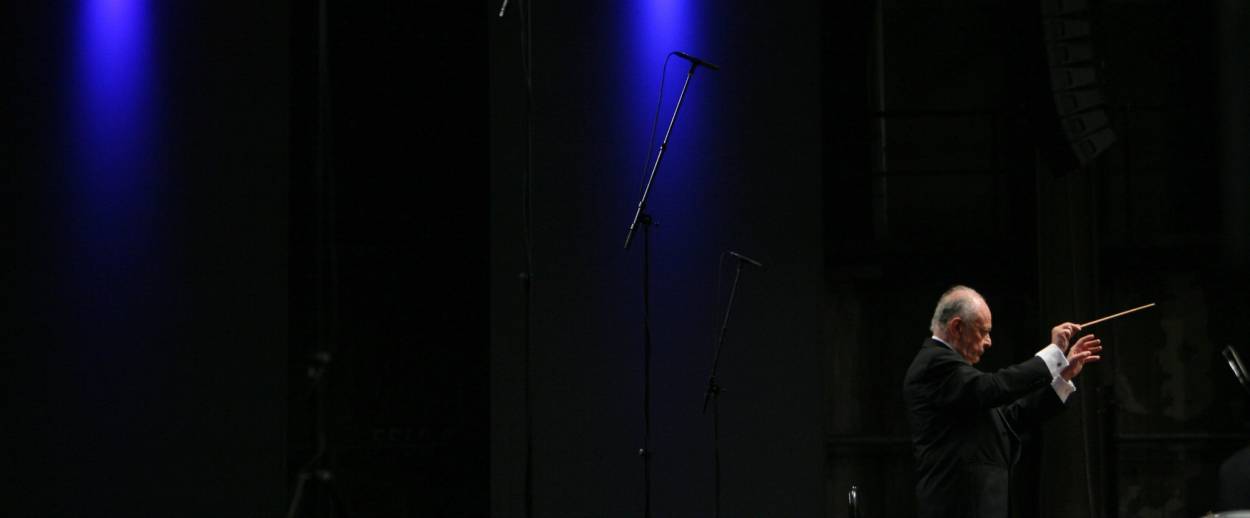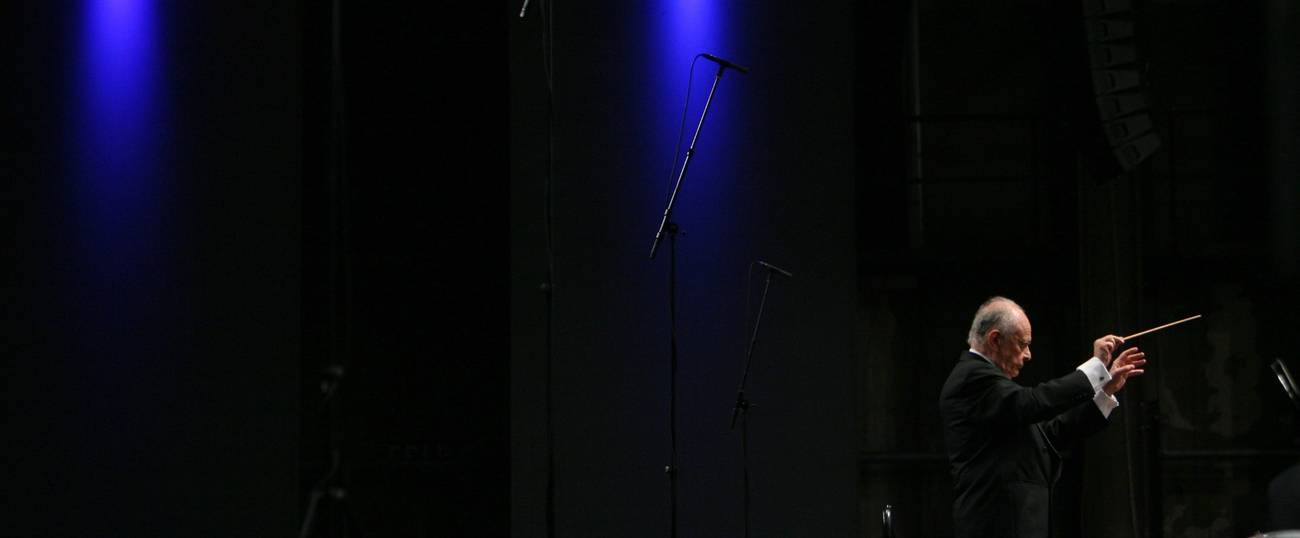Love Ensemble
At Carnegie Hall, a touching symphony reminded me of my late father, Gustav Mahler, and the Jewish principle, ‘ahavat ha’ger’—love of the stranger




On Monday night, I attended a one-off fundraising performance at Carnegie Hall of Mahler’s Second Symphony. It was played by Music for Life International (MFLI), an orchestra made up of musicians from great orchestras all over the world. Music for Life takes its name from the concerts of the same name that Leonard Bernstein organized and conducted at Carnegie Hall in the late ‘80s, to raise money to fight AIDS. Today, MFLI raises money to support humanitarian causes of all sorts; this concert supported HelpMeSee, a non-profit that helps disadvantaged people around the world gain access to vision-saving cataract surgery.
I am a philistine who does not listen voluntarily to classical music. But my late father was a huge, huge Mahler fan. Mahler’s big themes of death and resurrection resonated with him. As I’ve written here before, my dad survived childhood polio, had his first heart attack at 39, and suffered from ill health for much of his life. He was a choral singer, and I saved an email he wrote me in 1997 about his love for Mahler’s Second in particular:
“This is the piece I joined the Boston Pro Musica to sing. This is the piece that has haunted me since I was 10. This is the ‘Resurrection.’ When I sang this piece in May, 1996, The Malachamovess [his semi-ironic Yiddish-y pronunciation of the Hebrew name for the Angel of Death] was floating on his scrawny horse in front of the second balcony, and I looked him in his eye socket and said, ‘Listen to me, you motherfucker, listen to what I can sing!’ And he rode off in defeat.”
He’d also (semi-ironically, which was how he did almost everything) left instructions during the Vietnam War, when he was a Navy doctor stationed in Rhode Island, that if he were killed in action he wanted Mahler’s Second played at his funeral. Accordingly, we brought a boombox to the unveiling of his tombstone in 2005, turned it up to 11, and blasted that symphony.
A few weeks ago, my brother-in-law Neal suggested we go to the Carnegie Hall concert in honor of my dad. My husband Jonathan and I met Andy and Neal on 57th Street. We sat in the Dress Circle. I didn’t expect much. I associate all classical concerts with being dragged to boring cultural activities as a sullen child. So I was unprepared for George Mathew, Music for Life’s artistic director and the concert’s conductor, to make a speech that had me sitting up straight from my habitual classical-music-listening slouch and scrambling for a pen. I wound up scribbling much of his pointedly political introduction on my program:
“Music for Life’s musician’s represent 22 countries and 70 orchestras… We have different tunes, but we don’t just co-exist; we exist at an extraordinarily high level to make beautiful music. This is what a healthy society requires. Mahler himself was an immigrant. In this symphony, he wrote, “O glaube, mein Herz, o glaube/Es geht dir nichts verloren!” “O believe, my heart, oh believe / Nothing will be lost to you!” Mahler’s symphony tells us to believe that there will be a wonderful future ahead if we come together and make a difference as a community for our most vulnerable human beings.”
One doesn’t expect such words at a charity concert in the rarified atmosphere of Carnegie Hall. Up in the balcony, there were a few folded arms, but a lot more enthusiastic applause. What Mathew, not a Jew, was advocating for, was ahavat ha’ger—love of the stranger, a fundamental concept in our faith.
Perhaps because Mathew had won me over, perhaps because we were there to celebrate my dad, perhaps because I was spending my own money, perhaps because I was finally a grownup, I actually listened to the music. Without resentment. Without prejudice.
The moment the music began, I was rocketed into the past, to a sudden memory of my dad’s love of an old John Belushi sketch on Saturday Night Live, “Listening to Great Music.” Belushi listens to “Ride of the Valkyries” (whose composer, Richard Wagner, was a big musical influence on Mahler, and whose anti-Semitism my dad discussed with me and my brother when we were little). Belushi, dressed as a stuffy academic sitting by a vintage record player in his fusty study, encourages us to use our imaginations as we listen to see in our minds what Wagner was suggesting with his music. He puts on a record, listens for a moment, and bellows, “HORSES!” Then he shushes himself and murmurs quietly, with giant eyes, “horses!” (I leaned over to my brother at the start of the first movement and muttered “horses!” Andy giggled.) Belushi goes on with increasing animation: “People! Mountains! Snow! Landscapes! A horse! The sky! A field! A big show, with a lot of horses! A lot of people going into the show — some are trying to get in free!” Soon he’s screaming, “Ahhhh, rainbows! Waterfalls! Two people who meet and fall in love! And immediately they fly to Hawaii! Oh, they want to get married, but they can’t! Because the father doesn’t approve of the marriage! Suddenly there’s a war! Everybody’s going to Russia to fight the enemies! Aaagghh!! Look out! Look out! Spy planes and rockets! The Cossacks are coming! They’ve got Kirby! They’ve got Kirby! Medic! Medic!” And then he trashes the set.
This skit encapsulates my dad’s experience of classical music: Unpretentious, animated, passionate, and only sometimes rational. Like Belushi’s character, he heard everything in life in certain pieces; the Resurrection was one of them. He loved the wild swings in tone and sweetness and fury. He loved the bombast of it all, the fact that a humongous concert stage gets filled to bursting with 25 violins, 14 violas, 9 violoncellos, 9 double basses, 5 oboes, 9 French horns, 2 English horns, 6 clarinets, 5 bassoons, 10 trumpets, 4 trombones, 4 flutes, 6 kinds of drum and timpani and an organ. There are 2 harps, because fuck all y’all composers with your 1-harp compositions. At the Carnegie Hall concert, 5 extra French horns and 2 extra trumpets slipped in through the side doors at the last second before they were needed, then slipped back out. There were over 80 chorus singers, in addition, of course, to the soprano and mezzo soloists. For a split second, when I saw the stacked, boxy amplifiers on the sides of the stage, I thought they were bee boxes. Because hey, if Mahler used glockenspiels and bird sounds in his music, why wouldn’t he use bees?
I frequently found myself tearing up as I listened. The music was potent. I felt grateful to live in New York City. I loved being at Carnegie Hall with my husband, and with my brother and his husband, and I was glad my dad lived long enough to attend both our weddings. I was delighted that this music and this orchestra existed.
Since my dad died in 2004, I’d often thought about him and Mahler and death. But I’d never thought about Mahler as a political figure in a challenging time in history. That night, unable to sleep, I sat down at my computer to look for research on Mahler’s immigrant status and how it affected his work. I found an article by Victoria Hallinan of Northeastern University, “Gustav Mahler: Conducting Multiculturalism,” published in Graduate History Review in 2012. Hallinan argues that Mahler’s work reflects his experiences with political upheavals. As he moved from Budapest to Vienna to New York, his experiences with terrible anti-Semitism (he had to convert to Christianity to get a conducting job in Vienna, and anti-Jewish forces kept up a drumbeat of horrid statements about him), as well as with the multicultural world of NYC kept informing his music. He identified as an outsider. When he came to America—papers from Ellis Island show that he arrived on February 20, 1907, almost 110 years ago to the day—it was at a time of great distrust toward immigrants. Mahler noted with an edge, “A truly native American is a high-minded and capable person.” Indeed, Hallinan writes, “He noted the fear and suspicion of other nationalities that existed in New York, but to him this fear did not fully define the American approach to different cultures. Instead, he chose to focus on the signs of cultural diversity and acceptance that he found there.” But, she notes, he “developed early on a permanent sense of exile, ‘always an intruder, never welcomed.’”
He should have felt welcomed.
Marjorie Ingall is a former columnist for Tablet, the author of Mamaleh Knows Best, and a frequent contributor to the New York Times Book Review.